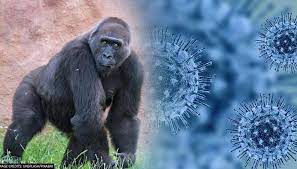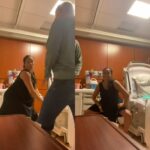
13 gorillas test positive for COVID-19 in Atlanta zoo
Published on September 13, 2021 at 9:42 AM by Mc Noel Kasinja
Thirteen western lowland gorillas at Zoo Atlanta have tested positive for Coronavirus.
Staff were alerted when several of the zoo’s troop of 20 western lowland gorillas began exhibiting symptoms, including runny noses, mild coughing and loss of appetite.
The Atlanta Journal-Constitution reported that fecal samples and swabs sent to the University of Georgia’s veterinary diagnostic laboratory showed that 13 of the great apes were positive for Coronavirus.
A staement released by the management of the zoo wrote;
“Recently, Gorilla Care Team members observed coughing, nasal discharge, and minor changes in appetite in several members of the gorilla population.
“Upon the onset of these signs, the Animal Care and Veterinary Teams immediately pursued testing for SARS-CoV-2. Fecal samples and nasal and oral swab samples were sent to the Athens Veterinary Diagnostic Laboratory at the University of Georgia, where they tested presumptively positive.
“Zoo Atlanta is waiting to receive the results of the confirmatory tests on samples sent to the National Veterinary Services Laboratory in Ames, Iowa.”
The zoo also revealed that the gorillas at risk of experiencing COVID-19 complications, are receiving monoclonal antibodies.
The statement added;
“The teams are collecting samples for testing for the Zoo’s entire gorilla population, which includes 20 members living in four troops, and will regularly test the gorillas regardless of the presence of symptoms.”
It is believed that the gorillas were infected by an employee who was fully vaccinated and wearing Personal Protective Equipment while caring for the animals, but later tested positive for COVID-19.
The zoo said;
“While humans are known to be able to transmit the virus to animals such as gorillas, and these cases have occurred at other zoos, there is currently no data to suggest that zoo animals can transmit the virus to humans.
“Regardless, Zoo Atlanta visitors do not pose a transmission threat to the gorillas or vice versa given the distance between the areas used by guests and the animals’ habitats.
“The teams are very closely monitoring the affected gorillas and are hopeful they will make a complete recovery. They are receiving the best possible care, and we are prepared to provide additional supportive care should it become necessary.
“We are very concerned that these infections occurred, especially given that our safety protocols when working with great apes and other susceptible animal species are, and throughout the pandemic have been, extremely rigorous.”
Before the gorillas tested positive, the zoo was waiting to receive a COVID-19 vaccine made specifically for animals and approved by the U.S. Department of Agriculture and Georgia’s State Veterinarian called Zoetis.
The doses have arrived at the zoo and staff will begin administering them to “Bornean and Sumatran orangutans, Sumatran tigers, African lions, and clouded leopard. As the gorillas recover, they will also receive the vaccine.”


